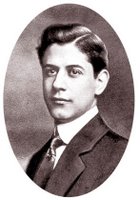 The 3rd World Chess Champion, Jose Raoul Capablanca of Cuba, is unique among all chessplayers. There is no way to know for sure, but it is very likely that Capablanca is the most naturally-talented chessplayer who has ever lived. Some may argue that this accolade belongs to Paul Morphy, but his opponents were nowhere near as strong as those that Capablanca would face. Modern champions like Botvinnik, Fischer, and Kasparov were incredibly hard-working, as was Capablanca's successor Alekhine.
The 3rd World Chess Champion, Jose Raoul Capablanca of Cuba, is unique among all chessplayers. There is no way to know for sure, but it is very likely that Capablanca is the most naturally-talented chessplayer who has ever lived. Some may argue that this accolade belongs to Paul Morphy, but his opponents were nowhere near as strong as those that Capablanca would face. Modern champions like Botvinnik, Fischer, and Kasparov were incredibly hard-working, as was Capablanca's successor Alekhine.Born in 1888, Capablanca was reputed to have learned the game of chess at the age of 4 simply by watching his father and a friend play. The child even insisted that his father moved the knight improperly! Capablanca's father challenged Jose to a game, but lost to the 4-year old...
Capablanca became champion of his country at the age of 12 by defeating Juan Corzo in a match. If that happened today, the boy would have been headline chess news around the world and would be sponsored to receive the best training and tournament opportunities. But in those days, that was not the case, and there were also a much lower number of strong tournaments.
It wasn't until 1909 that Capablanca really gained worldwide attention: he defeated the new U.S. Champion Frank Marshall in a match by the crushing score of 8-1 with 14 draws. To show how extraordinary a feat this was, bear in mind that Marshall would remain U.S. Champion until 1936—and not because he was defeated, but because he retired!
It was the vanquished Marshall who insisted that Capablanca be allowed to play in the very strong San Sebastian tournament of 1911. This was the Cuban's international debut, and he won the tournament! After racking up more and more international victories, Capablanca challenged Lasker for the World Championship. Lasker, believe it or not, resigned the title to Capablanca in 1920, but they played a match the next year. Capablanca led the match 4-0 with 10 draws before Lasker resigned that match.
Capablanca played tens of thousands of games in simultaneous exhibitions over the course of his career, but he lost no tournament games from 1916 to 1924! This is feat is unmatched. Capablanca was considered invincible, and with good reason: no one understood chess better, played the game so clearly and cleanly, and no one—even to this very day—has ever surpassed Capablanca's endgame technique.
The next world champion, Alexander Alekhine, defeated Capablanca in the 1927 World Championship match held in Buenos Aires, Argentina. It is widely believed that if the two played another match, Capablanca would have won, but Alekhine never offered him a rematch, and years later said that he could not explain how he managed to win in 1927. Still, Capablanca was one of the top players in the world, until his health began to fail him at the end of the 1930s. He died at the Manhattan Chess Club in 1942.
Alekhine said: "With his death, we have lost a very great chess genius whose like we shall never see again."
So true. In the modern age of chess, top players are made, not born.

No comments:
Post a Comment